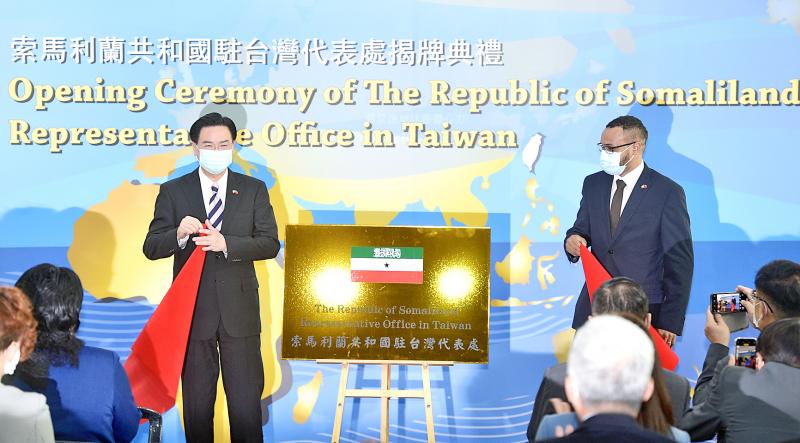The Republic of Somaliland Representative Office in Taiwan was yesterday inaugurated by Minister of Foreign Affairs Joseph Wu (吳釗燮) and Somaliland Representative to Taiwan Mohamed Omar Hagi Mohamoud, with both emphasizing the nations’ common values of freedom and democracy, and cooperation on trade and energy sources.
The Taiwan Representative Office in Somaliland was opened in Hargeisa on Aug. 17. It is the nation’s only embassy that has “Taiwan” in its English name.
While Taiwan and Somaliland do not have diplomatic relations, the announcement in July of the planned representative offices brought condemnation from China and Somalia, with each saying that their territorial integrity is indivisible.

Photo: George Tsorng, Taipei Times
Taiwan and Somaliland have since 2009 collaborated on healthcare, education and maritime security, and the new office’s opening marks a new chapter in bilateral relations, Wu said, naming fisheries, energy and agriculture among the areas targeted for cooperation.
The two nations “share a commitment to safeguarding the values of freedom, democracy, justice and the rule of law,” he said. “We both face external pressures, but we are proud of our sovereignty and ready to defend it.”
“From now on, Taiwan is your second home,” Wu told Mohamoud and diplomatic personnel from Hargeisa.
In his speech, Mohamoud described Somaliland-Taiwan ties as a special and historic relationship between “two champions of democracies in Africa and Asia.”
Somaliland is a free, democratic, independent and sovereign nation, that has established bilateral relations with many other countries in Africa, North America, Europe and Asia, he said.
The path to a more prosperous world is through dialogue and cooperation, not through the pursuit of a foreign policy that infringes on the affairs of other nations and sows the seeds of division, he added.
The Somaliland government is encouraging international investment through incentives such as tax exemptions and land leases, he said.
The nation’s resources of hydrocarbon deposits, coal, gemstones and industrial minerals are worth the investment, he said, adding that seismic surveys have indicated potential oil and gas deposits in the nation.
Ecotourism is another potential area for investment, with visitors encouraged to explore ancient caves, beautiful beaches and mountains, and spectacular landscapes, he added.
Somaliland President Muse Bihi Abdi sent his best wishes in a prerecorded video.
“With the global economy shifting, and the Horn of Africa, the Red Sea and the Gulf of Aden becoming focal points of international interest, we believe that it is time for Somaliland to initiate efforts to strengthen relations in areas of common interest that may promote bilateral trade and economic cooperation among equals with your country and all other nations in the world,” he said. “The bilateral accord of our two countries is based on our common values of freedom and democracy. It is a spirit of mutual assistance that will never expose any harm whatsoever to the interests of other countries, but rather contributes to international peace and regional economic activities.”
The Somaliland office is on Ningbo W Street in Taipei’s Zhongzheng District (中正), although yesterday’s ceremony was held at the Ministry of Foreign Affairs’ Institute of Diplomacy and International Affairs, reportedly due to the office’s limited space.

Conflict with Taiwan could leave China with “massive economic disruption, catastrophic military losses, significant social unrest, and devastating sanctions,” a US think tank said in a report released on Monday. The German Marshall Fund released a report titled If China Attacks Taiwan: The Consequences for China of “Minor Conflict” and “Major War” Scenarios. The report details the “massive” economic, military, social and international costs to China in the event of a minor conflict or major war with Taiwan, estimating that the Chinese People’s Liberation Army (PLA) could sustain losses of more than half of its active-duty ground forces, including 100,000 troops. Understanding Chinese

The Ministry of Foreign Affairs (MOFA) yesterday said it is closely monitoring developments in Venezuela, and would continue to cooperate with democratic allies and work together for regional and global security, stability, and prosperity. The remarks came after the US on Saturday launched a series of airstrikes in Venezuela and kidnapped Venezuelan President Nicolas Maduro, who was later flown to New York along with his wife. The pair face US charges related to drug trafficking and alleged cooperation with gangs designated as terrorist organizations. Maduro has denied the allegations. The ministry said that it is closely monitoring the political and economic situation

UNRELENTING: China attempted cyberattacks on Taiwan’s critical infrastructure 2.63 million times per day last year, up from 1.23 million in 2023, the NSB said China’s cyberarmy has long engaged in cyberattacks against Taiwan’s critical infrastructure, employing diverse and evolving tactics, the National Security Bureau (NSB) said yesterday, adding that cyberattacks on critical energy infrastructure last year increased 10-fold compared with the previous year. The NSB yesterday released a report titled Analysis on China’s Cyber Threats to Taiwan’s Critical Infrastructure in 2025, outlining the number of cyberattacks, major tactics and hacker groups. Taiwan’s national intelligence community identified a large number of cybersecurity incidents last year, the bureau said in a statement. China’s cyberarmy last year launched an average of 2.63 million intrusion attempts per day targeting Taiwan’s critical

AGING: As of last month, people aged 65 or older accounted for 20.06 percent of the total population and the number of couples who got married fell by 18,685 from 2024 Taiwan has surpassed South Korea as the country least willing to have children, with an annual crude birthrate of 4.62 per 1,000 people, Ministry of the Interior data showed yesterday. The nation was previously ranked the second-lowest country in terms of total fertility rate, or the average number of children a woman has in her lifetime. However, South Korea’s fertility rate began to recover from 2023, with total fertility rate rising from 0.72 and estimated to reach 0.82 to 0.85 by last year, and the crude birthrate projected at 6.7 per 1,000 people. Japan’s crude birthrate was projected to fall below six,